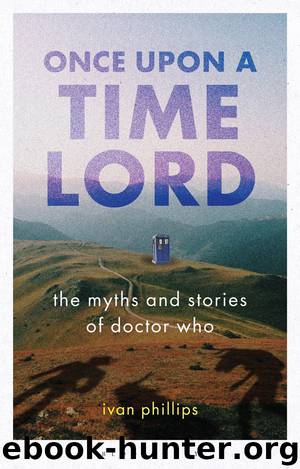Once Upon a Time Lord by Ivan Phillips

Author:Ivan Phillips
Language: eng
Format: epub
Publisher: Bloomsbury Publishing
The Doctor as hero: A good man, an idiot, the destroyer of worlds
In a 1983 essay John Fiske argues that the form of heroism represented by the Doctor can best be ‘defined according to … a post-romantic, individualistic, capitalist set of criteria’.31 Recognizing that the character is ‘essentially a healer, particularly of sick societies’, Fiske associates him with an outlook that is liberal-humanist in temperament but fundamentally conservative in impact. Leaving aside the question of what it means to be a humanist when you are not human (or, perhaps, when you are only half human, depending on questions of canon), Fiske is surely right to argue that the Doctor’s political and ethical identity, for all the variability of its production contexts, has been shaped from the outset by the dominant ideology of the culture that created it.32
Good, solid, decent: embodying the values of the BBC (here seen as implicitly and stably Reithian), the Doctor champions ‘good’ against ‘evil’, ‘right’ against ‘wrong’, in a universe that is, superficially at least, unambiguous in its morality. The most troubling aspect of this for Fiske, who bases his reading on a single story, David Fisher’s ‘The Creature from the Pit’ (1979), is that it leads the Doctor into an unquestioning collusion with free trade economics, ‘naturalised’ as not only ‘the obviously right system’ but ‘the only system possible’. As a piece of popular art, Doctor Who is trapped in a reactionary position, snagged in the wheels of mythic process à la Barthes: ‘An art form which is radically opposed to dominant social discourses would not be popular, but would appeal largely to the converted … It would lose the mass appeal necessary for effective social change.’33 In other words, the Doctor cannot help being a hero fit for the age of late capitalism.
Fiske’s analysis is neatly done, making its case via a steady extrapolation from an ever-so-close reading of the chosen object. It is reasonable in its tone, even-handed in its approach and very much of its time. It is also, for these reasons, extremely limited as a reading of a text as complex and extensive as Doctor Who (even as it was in 1983, before decline and fall, Virgin books, the TV movie, Big Finish, the RTD regeneration and Jodie Whittaker). The problem is that it represents only one way of evaluating the mythology, a perfectly serviceable and valid way, but one that is only ever going to yield one result: that the Doctor is a white, eccentric patriarch travelling in a universe constructed from British (often English) preoccupations and prejudices, in thrall to a more or less submerged imperial narrative, troubled by nostalgia, disrespectful of authority and any perceived Establishment, but ultimately compliant and reactionary. This is the character as he emerges from between the lines of Alec Charles’s essay on Doctor Who’s ‘ideology of anachronism’.34 It is the character that can be discerned through Tulloch’s exploration of national politics as represented in (again, a single story) ‘The Monster of Peladon’.35 It
Download
This site does not store any files on its server. We only index and link to content provided by other sites. Please contact the content providers to delete copyright contents if any and email us, we'll remove relevant links or contents immediately.
Cecilia; Or, Memoirs of an Heiress — Volume 1 by Fanny Burney(32523)
Cecilia; Or, Memoirs of an Heiress — Volume 2 by Fanny Burney(31928)
Cecilia; Or, Memoirs of an Heiress — Volume 3 by Fanny Burney(31912)
The Great Music City by Andrea Baker(31895)
We're Going to Need More Wine by Gabrielle Union(19019)
All the Missing Girls by Megan Miranda(15882)
Pimp by Iceberg Slim(14461)
Bombshells: Glamour Girls of a Lifetime by Sullivan Steve(14037)
For the Love of Europe by Rick Steves(13792)
Talking to Strangers by Malcolm Gladwell(13327)
Norse Mythology by Gaiman Neil(13312)
Fifty Shades Freed by E L James(13214)
Mindhunter: Inside the FBI's Elite Serial Crime Unit by John E. Douglas & Mark Olshaker(9283)
Crazy Rich Asians by Kevin Kwan(9256)
The Lost Art of Listening by Michael P. Nichols(7475)
Enlightenment Now: The Case for Reason, Science, Humanism, and Progress by Steven Pinker(7287)
The Four Agreements by Don Miguel Ruiz(6726)
Bad Blood by John Carreyrou(6597)
Weapons of Math Destruction by Cathy O'Neil(6243)
